Honors College Dean Zofia Burr describes Honors 410 as “an advanced Honors 110,” where students still work on their own individual projects in a classroom of students pursuing other types of projects from a range of different disciplines.
The main difference between the two courses is that students who take the Multidisciplinary Seminar have more experience in their fields than those in Honors 110, a course titled “Principles of Research and Inquiry” that is usually taken during an Honors College student’s first semester.
For Dean Burr, the Multidisciplinary Seminar represents the types of dialogues she hopes people will have in their everyday lives.
The way the world works now, we’re not very encouraged to get out of our own lanes and understand each other . . . [but] you really need to bring together people who think very differently to address the hardest problems.
Dean Zofia Burr
Dean Burr believes in the wider importance of the interdisciplinary, collaborative space that the thesis preparation course nurtures. “For research, for solving problems, you really need to bring together people who think very differently to address the hardest problems.” Both she and Richard Todd Stafford, who co-teaches the class, emphasize that many significant civic and professional problems require this kind of collaboration.
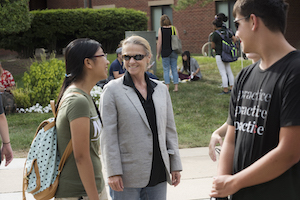
Dean Zofia Burr
The Honors College curriculum is being redesigned. For the most part, these changes will affect students arriving for their first semesters in Fall 2019. However, current students will want to know about changes in some course numbers. For instance, Honors 410 will be renumbered to fit the requirements that students coming to Mason in the fall will be required to fulfill. So students will no longer find Honors 410 Thesis Proposal: Multidisciplinary Research and Creative Projects Seminar and Honors 411 Thesis: Multidisciplinary Research and Creative Projects Seminar in the Fall 2019 schedule. Instead, there will be an Honors 361: Multidisciplinary Practicum: Multidisciplinary Research and Creative Projects Seminar available that offers the same experience.
Dean Burr emphasizes taht the curriculum adjustments will optimize the Honors College experience.
“There’ll be more options for the challenge-driven opportunities to do service-learning, but it’ll all be in keeping with the multidisciplinary, research-driven approach that we’ve had throughout,” explains Dean Burr. “We’re trying to — with the upper division [courses] — support more of the multidisciplinary problem solving that [students] are already doing,” said Dean Burr.
Dean Burr and her co-instructor Richard Todd Stafford, cleary enjoy the opportunity to see students learn to communicate across disciplinary, methodological, and professional boundaries. “I like the opportunity to really think about things from different perspectives,” said Dean Burr. “I find it very enriching, creatively and intellectually.”
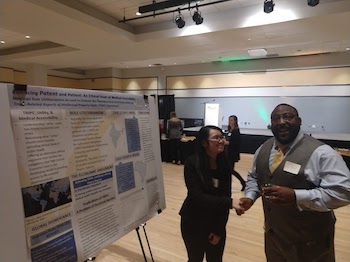
Kelly Mai presents her research to Honors College Director of Development Valentino Bryant
Kelly Mai
Kelly Mai, a sophomore, began her research for Honors 410 while still a freshman in Honors 110. Over the summer of 2018, Mai continued her work by enrolling in Honors 410. Ultimately, Mai finished her work in Honors 411, a course that has been offered concurrently with Honors 410 for continuing students, in Fall 2019. Her experience refining and developing this project reflect the kind of opportunity for ongoing development that the recent Honors College curriculum redesign is intended to foster and encourage.
“It was an ever-evolving question,” said Mai, explaining how she had to narrow her scope to make her research more manageable.
Mai tackled a controversial topics through her research project, entitled “Balancing Patent and Patient: An Ethical Issue of Medical Accessibility.”
“[I looked] at the economic, ethical implications of a strong patent protection system for pharmaceuticals in the developing world,” explained Mai.
Mai, a Philosophy major, noted how patent protection for life-saving medicines exposes a troubling question for the overlap of economics and ethics.
“There’s this underlying question of whether you can place a price on human suffering, and that’s where you can pull in realms of ethics,” said Mai.
Mai used case studies from countries like India and Brazil to inform her study, and her research offers a new perspective to use when examining this issue—structural injustice.
“[Structural injustice] is this idea that there are relationships between high-income countries and low-income countries that are perpetuating poverty in the lack of medical accessibility,” Mai said of how she applies this concept from ethics and political philosophy.
Mai paired structural injustice and rule utilitarianism—the theory that an action is ethical if it maximizes the good—to inform her research. This work has also informed her further study of ethics during a Study Abroad trip at Oxford University in Spring 2019.
Mai describes the Multidisciplinary Seminar as an opportunity to become a more disciplined researcher, mentioning that it was especially helpful to her efforts to develop a clear, concise, and answerable research question.
“Your professors really know how to guide you,” Mai said. “[This course] has helped me really grow to think critically and ask better questions.”
Mai hopes to craft research that speaks to broad range of communities with a range of differing perspectives. To facilitate this, Mai considers how multiple disciplines can inform our understanding of her question.
Although she brings evidence produced by scholars of economics to bear on her work, Mai argues that, if scholars want to provide guidance about how we ought to organize this industry, “there should be more ethics.”
“I would just hope that [my research] would remind people to look at more disciplines when looking at a grand issue,” said Mai.
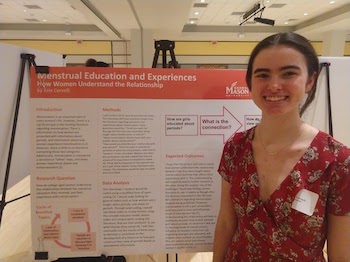
Erin Cervelli poses with her Honors 410 research poster
Erin Cervelli
Erin Cervelli, a sophomore Dance major, also tackled a question dealing with health, developing research she began in Honors 110 in to a research proposal that she plans to submit to the Office for Student Scholarship, Creative Activities, and Research (OSCAR) Undergraduate Research Scholars Program (URSP), so that she can be funded to undertake the interviews necessary to answer her research question.
Cervelli’s research focused on the menstrual education of women, examining the relationships women have with their menstrual cycles.
The dancer found research inspiration from her life experiences. When Cervelli did not find much research answering the questions she had posed, she decided that the best approach would be to conduct her own interviews.
“I was looking at how women are educated about menstrual experiences and how that affects their […] periods, but I found that there wasn’t a connection between those two things, so I had to find it myself,” said Cervelli.
Cervelli credited the interdisciplinary experience of the course for helping her develop a strong proposal.
“Having to explain my research to people in different disciplines than me made me have to see what I didn’t understand as well and see how I can communicate that to other people,” Cervelli said. Cerveilli goes further, stating that she also found inspiration from the research methods used in the research conducted by her Honors 410 peers Madison Gaines and Tharuna Kalaivanan.
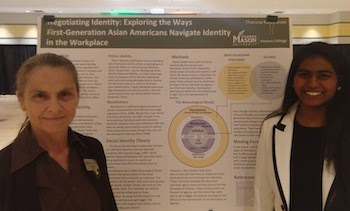
Dean Zofia Burr poses with Tharuna Kalaivanan in front of Tharuna's Honors 410 research poster
Tharuna Kalaivanan
Sophomore Tharuna Kalaivanan focused on identity issues among first-generation Asian Americans in her research titled “Negotiating Identity: Exploring the Ways First-Generation Asian Americans Navigate Identity in the Workplace.”
Kalaivanan, a Psychology major, developed the idea for the topic after taking an Honors 130 section with Honors College professor Dr. Blake Silver. Inspired by her work in Honors 130 and inspired by her social scientific research in Dr. Silver’s Honors 330 Social Science Research Lab, Kalaivanan decided to begin investigating how first-generation college students approach life and their identities after college.
“For a lot of these students, school has been a large part of their life, and so they kind of build their identity off of that,” Kalaivanan explained. “When they’re leaving the institution of school or university, how does that play into their identity?”
Kalaivanan’s experience in this course inspired her to pursue the research even further. Though Kalaivanan initially did not find a lot of material to work with, she was able to establish a broader scope during her search of the literature. She then uses these broader scholarly conversations to inform the work she is doing.
Kalaivanan echoed Dean Burr and her student peers when explaining the value of the Multidisciplinary Seminar opportunity.
“With a diverse group in [Honors] 410, there’s people from different backgrounds that are not necessarily familiar with your research or what kind of viewpoint you’re coming from, so it’s really a good chance for you to communicate your research to other people who are outside of your disciplinary [area],” said Kalaivanan.
Kalaivanan hopes that her research encourages leaders in the workplace to accept all aspects of everyone’s cultural makeup.
“Yes, you can hire a diverse group of people, but are you really accepting them as who they are or their culture?” Kalaivanan questioned, noting how nondominant cultures can be suppressed in the workplace.
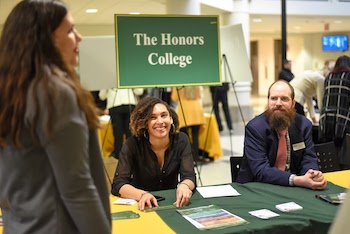
Maddie Gaines and Honors 410/411 instructor Richard Todd Stafford
Madison Gaines
Another student who tackled the issue of conflicting identities is sophomore Madison Gaines with her research titled “Illuminating Biracial Identity at the Juncture of Social Science and Poetry.”
Gaines, a Creative Writing major, used her research to explore her own identity as a biracial person through poetry. Her project creates a unique presentation of what it means to have a multiracial identity through its combination of social science and the arts.
Gaines developed the idea for her project while taking a course on social injustice with Dr. Silver.
“At the end of the class, we had to do an autoethnography, so writing about your own injustice in your own life, and kind of delving into those,” Gaines said, explaining how she used her final project to analyze her biracial identity.
Dr. Silver’s project allowed students the freedom to express their thoughts in ways they find personally meaningful, and Gaines used her creative writing background to present hers through poetry.
“I had a collection of poems that looked at myself and my biracial experience and what that means for me,” said Gaines.
Afterwards, Dr. Silver approached her about submitting a proposal to the Office of Student Scholarship, Creative Activities, and Research (OSCAR) to do further work. With her proposal accepted, Gaines continued her research on the biracial/multiracial identity through Honors 410 in tandem with the UNIV 495 OSCAR Undergraduate Research Scholars Program coursework. Dean Burr notes that many Honors Colleg students elect to take on this challenging, yet rewarding, combination.
Gaines combined multiple social science and poetic lenses to create her research, conducting interviews with people who identified as biracial and using their voices as inspiration for the poetry.
The poet appreciated the support she received from her Multidisciplinary Seminar peers and instructors in tackling such a creative research project. While Hoinors 110 does not generally include a creative option, the Multidisciplinary Seminar supports students who seek to pursue creative projects. Past students have worked on novels, plays, and even original musical scores.
“They let me read some of my poems in class, and I got feedback on [them],” Gaines said, adding that this was helpful in creating effective poetry for her research
Gaines hopes that her research encourages other social scientists to see the value in incorporating the fine arts with their work.
“If they do those artistic methods, then they’re going to reach a greater audience that way,” explained Gaines. “I want the biracial identity to be known, and the multiracial identity to be known, and the only way that that can happen is if I write poetry about, because that’s what I do best,” said Gaines, describing how hearing and writing about others’ experiences as biracial individuals was “cathartic.”
“Knowing that you’re not alone in an identity is the most helpful thing you can ever experience,” explained Gaines.
This research was recently covered by George Mason News and she was interviewed by the Honors College about the process of creating this collection. She presented her poetry at Epicure in Fairfax last semester. and will present her research at the Cultural Studies Association’s annual conference in New Orleans, Louisiana this May.
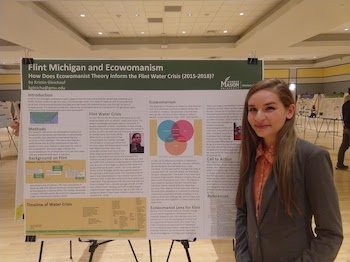
Kristin Gleichauf with her Honors 410 research poster
Kristin Gleichauf
Another student who used her Multidisciplinary Seminar experience to explore a timely issue is senior Kristin Gleichauf.
Gleichauf examined how ecowomanism, which focuses on women of color and their activism for the environment, could be used to inform our understanding of the water crisis in Flint, Michigan.
While taking a course on "environmental justice," Glechauf, an Integrative Studies major with a Social Justice and Human Rights concentration, saw a gap in discussions about the connection between gender and the environment. She learned about the term “ecowomanism” from her research in another class and began thinking about how it could be applicable to fill this gap.
While she entered the Multidisciplinary Seminar with a broad idea of what she wanted to study, Gleichauf credited her professors for encouraging her to fill this significant gap in the discourse. Gleichauf used “ecowomanism” as the driving force of her research.
“[Women of color] were the ones who were most affected by this [crisis],” Gleichauf said. “Their wants and needs need to be put forth, and the government should follow [them]. It shouldn’t be the other way around.”
Gleichauf hopes that government officials making policy changes for Flint, Michigan listen to the women in the city who are being directly affected by the issue. She also hopes her research can help prevent future crises like the one occured Flint, Michigan.
Gleichauf also reflected on the complexities of being an effective scholarly "ally" through her research.
“I’m dealing with issues that [emerge for people] with identities that I don’t have,” Gleichauf said, emphasizing the importance of adding to this conversation while remaining respectful to the identities impacted by the issue.
Sara Huzar
Honors College Senior Sara Huzar took the Multidisciplinary Research and Creative Projects seminar in the summer of 2018, investigating how “fake news” articles published in the Ukraine in 2014 framed questions of cultural identity. She was particularly interested in understanding whether these articles tended to aggravate pre-existing ethnic tensions.
Huzar was inspired to undertake this project after taking a semester to intern for the State Department in Kyiv. While there, she became interested in how modern Ukrainians understand their national identity and history. Specifically, Huzar says that she became “interested to see how Russia was weaponizing that cultural history and memory in its disinformation campaigns.”
Drawing on George Mason University Professor Karina Korostelina’s ethnographic work developing predictors of ethnic conflict in the region, Huzar created a set of categories and a scale by which to classify the fake news articles in the archive with which she was working.
Huzar says that, in addition to giving her some structure and deadlines for the research over the Summer, the seminar gave her opportunities to see how people who did not share her background would make sense of her research: “bouncing ideas off of my classmates and having to explain and defend my methodology to them helped me see areas of weakness in my methods and take steps to improve them.”
Huzar had the opportunity to present about her work on at an academic conference in Boston in Fall 2018. She hopes to“continue working on how culture and identity issues affect security and politics,” saying that she thinks that this research can contribute to diplomacy and peacebuilding.
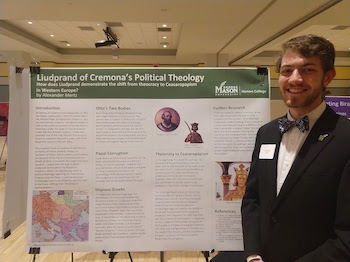
Alex Mertz with his Honors 410/411 research poster
Alexander Mertz
Honors College Senior Alexander Mertz first took the course over Summer 2018, then continued an additional semester into Fall 2019. His project involved historical research with a mentor he had previously worked with on an OSCAR-funded project. The work he did in Summer 2018 ultimately resulted in a project titled “Liudprand of Cremona’s Political Theory.” The Mathematics major studied how Bishop Liudprand of Cremona's writings show the transition of government and politics in western Europe.
“I had conducted research on the relationship between bishops and emperors in the fourth century, right after Constantine converted to Christianity,” said Mertz, explaining that he wanted to examine this relationship from another time period. His research advisor introduced him to Liudprand of Cremona from the tenth century.
Liudprand proved to be a complex subject for Mertz to analyze.
“Liudprand’s writings are not monolithic,” Mertz said. “His attitudes about the Byzantine Empire and about the hierarchy between the Pope and the Holy Roman Emperor change from his early writings to the later ones.”
These findings influenced Mertz to look for details about Liudprand’s life that might help illuminate these shifts. Mertz ultimately chose to explore the combination of religious and political strife present at the Synod of Rome in 963 CE.
“A group of bishops and Emperor Otto the Great deposed the pope of Rome and appointed his replacement,” explained Mertz. “This synod was unprecedented and occurs in the midst of Liudprand’s writings, […] and I argue that it is instrumental in changing Liudprand’s views.”
Mertz found that Liudprand also played a key role in the synod as he was the only person who wrote of the proceedings and its aftermath.
Mertz credits his Multidisciplinary Seminar professors and classmates for helping him develop a “concise thesis” that helps him explain and make sense of Liudprand’s changing views.
“I had a lot of trouble in the early stages of the project with finding an interesting aspect of Liudprand’s life and writings to research, but this course sequence really helped me figure that out,” said Mertz.
Examining a complex, everchanging figure like Liudprand reinforced for Mertz the importance of putting different perspectives in context.
“To really understand Liudprand, I needed to focus on his religion, his politics, the economic situation between East and West, the concept of honor and respect, and more,” said Mertz, adding, “As my research went on, I realized that I needed to look at a series of events in his life, which involved numerous lenses and frameworks, until things finally ‘clicked.’”
Now, Mertz is already looking for ways to expand even further on this research.
Mertz attended an event at Dumbarton Oaks, a research library with a focus on Byzantine studies. There, he heard a guest speaker who helped him identify some new paths for future research in this area. Mertz is also considering using his research on Liudprand for a graduate thesis. Whether Liudprand remains a figure of his studies or not, Mertz values the experience he has had researching this bishop.
“I think this project has refined my research skills,” said Mertz, who also appreciates the greater understanding he gained of Medieval Europe and Byzantium.
Mertz will present his research this April at Longwood University’s annual medieval history conference “Meeting in the Middle: Forging Medieval Identity.” He is eager to be immersed in medieval scholarship.
“I’m hoping to discuss [my research] with some medieval historians who can help me with their expertise,” said Mertz.
